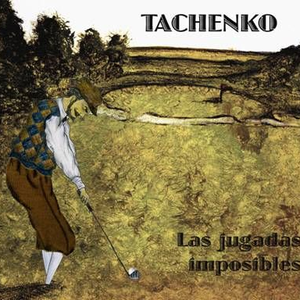1986
Tachenko Lyrics
Jump to: Overall Meaning ↴ Line by Line Meaning ↴
Cuando no sabía nada de ti?
Argentina 3- Alemania 2
Y esto va a acabar así
¿Dónde estabas en el 82
Cuando Italia conseguía su fin?
Yo un verano más llego a la final
Tiras a puerta sin pensar
Sin han aprendido ya a animar
Te dirá que sí, te dirá que sí
Entrenaba con la Holanda de Cruyff
Pero nunca le tocó decidir
Kempes, díselo: todo terminó
Y el balón es para mí.
Tiras a puerta sin pensar
Si han aprendido ya a animar
Te dirá que sí, te dirá que sí
In "1986," Tachenko asks "Where were you in '86 when I knew nothing about you?" The lyrics describe a fondness for a time when the singer was unaware of someone who is now important to him. In contrast, the singer has memories of the 1982 World Cup, when Italy won and he found himself in yet another final but couldn't win. In these two stanzas, the song explores the paradox of things happening at the same time but in different realms - in this case, the singer is drawn to the present but is melancholy about the past.
Line by Line Meaning
¿Dónde estabas en el 86
Asking where the person was in 1986
Cuando no sabía nada de ti?
When I didn't know anything about you
Argentina 3 - Alemania 2
Referring to the World Cup final score between Argentina and Germany in 1986
Y esto va a acabar así
Implying that the story will finish this way
¿Dónde estabas en el 82
Asking where the person was in 1982
Cuando Italia conseguía su fin?
When Italy won the World Cup in 1982
Yo un verano más llego a la final
Implying that the singer came close to achieving something but fell short
Pero no paso de ahí
But didn't make it past there
Tiras a puerta sin pensar
Shooting without thinking
Sin han aprendido ya a animar
If they've already learned to cheer
Te dirá que sí, te dirá que sí
He'll tell you yes, he'll tell you yes
Entrenaba con la Holanda de Cruyff
Referring to Johan Cruyff's Netherlands team of the 1970s
Pero nunca le tocó decidir
But he never got to decide
Kempes, díselo: todo terminó
Mentioning Mario Kempes, the Argentine forward who scored in the 1978 World Cup final, to emphasize that everything is over
Y el balón es para mí.
And the ball is mine.
Contributed by Lucy L. Suggest a correction in the comments below.
